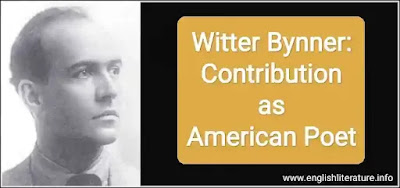Also Read
Witter Bynner (1881-1968) was born in Brooklyn and is a graduate of Harvard in the class of 1902. He took the impress of his university and recorded it not only in an “Ode to Harvard” (1907)—reprinted in “Young Harvard and Other Poems”—but also in the two plays that followed, “Tiger” (1913) and “The Little King” (1914), neither of which have anything to do with Harvard, but both of which reflect the intelligent interest in drama encouraged at that seat of learning. Aside from “Iphigenia in Tauris” (1915), his remaining work, in which his real distinction lies, is the single poem “The New World” (1915) and the collection “Grenstone Poems” (1917). Into both of these are woven threads of the same story—the poet’s love and marriage to Celia, the inspiration which comes to him from her finer nature, the birth and loss of their child, the death of Celia, his dull bereavement, the dedication of his life to the democracy which Celia had taught him to understand.
“Grenstone Poems” is a series of little idyls comparable in some respects to Frost’s “A Boy’s Will.” They are wholly individual in tone, presenting in brief lyrics, nearly two hundred in number, the quaint and lovely elements in the humor and the tragedy of life. “The New World,” in contrast, contains by implication much of this, but is constructed in nine sections which trace the progressive steps in the poet’s idealization of America. Always Celia’s imagination leads far in advance of his own. Again and again as he strives to follow, his triumphant ascent reaches as its climax what to her is a lower round in the ladder. Two passages suggest the theme in the abstract, though the beauty of the poem lies chiefly in the far implications of definite scenes and episodes. The first is a speech of Celia’s:
It is my faith that God is our own dreamOf perfect understanding of the soul.It is my passion that, alike through meAnd every member of eternity,The source of God is sending the same stream.It is my peace that when my life is whole,God’s life shall be completed and supreme.
The second, with which this volume may well conclude, is in the poet’s own words:
In temporary painThe age is bearing a new breedOf men and women, patriots of the worldAnd one another. Boundaries in vain,Birthrights and countries, would constrainThe old diversity of seedTo be diversity of soul.
